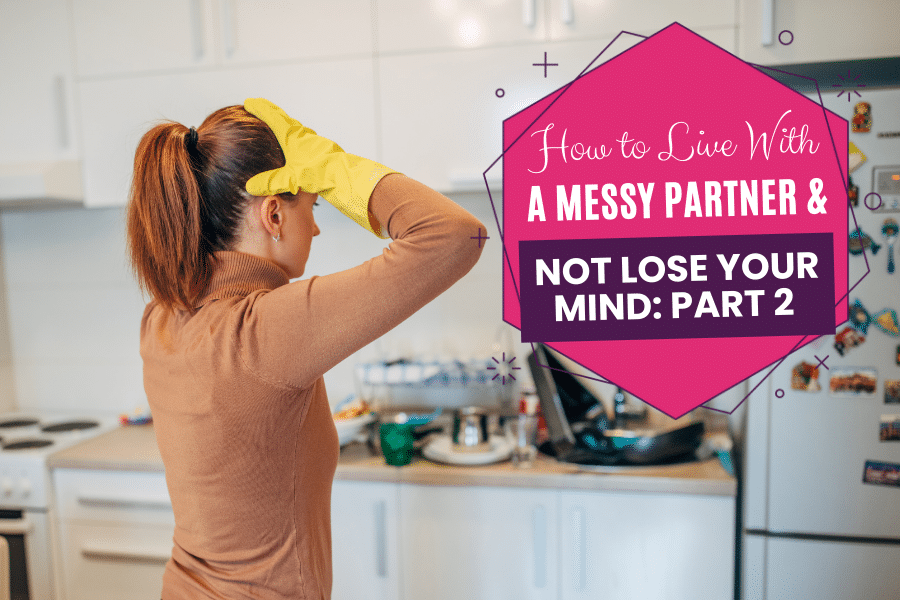Living with a messy partner is super stressful.
(You can read part 1 of this here.)
I know, I know, it can be sooo stressful when your partner has a totally different view of what’s reasonable in a relationship when it comes to mess around the house. Just read some of the comments in our previous blog post on this topic. Here’s a few recent stories you shared:
“I feel really burned out by the role my wife’s messiness has put me in. It’s like I’ve a teenager in the house. I’ve even hired a cleaner to come once a week as my wife requested and still the house is a mess…”
“I feel neglected, I feel frustrated, every time we’ve tried making an agreement she breaks it almost instantly, although I love her deeply, when you’ve been laid up incapable of even walking, and she still won’t lift a finger to tidy anything, it actually emotionally hurts and frustrates the hell out of me.
My husband is oblivious to spills on the counter and floor, and the bathroom counter and sink are no better. I empathize with you totally. I just tell myself that this was the way they were raised (he is also incapable of closing drawers ll the way, and leaves his jacket and caps wherever he wants. I am still waiting for him to bring down the boxes to store away our Christmas decor. I have Fibromyalgia so my strength is limited. I tell him that was not put on this earth to clean up after HIM.”
“I can relate with the above stories and feel for you all. My story is similar, my man is a slob. I am not at all to the level of ocd but I like to be organized and neat in appearance and how I keep my home. I have been with the slob for 10 years. I love this man too the moon and that’s the only reason I am still with him. I knew he had ADHD when I met him but didn’t know the extent.”
“My partner and I are in a constant fight when it comes to cleaning. He will clean a little, like half packing the dishwasher then go sleep or play his game for the rest of the day. Talking about how he’s going to finish cleaning but he never does! He’s said he will take the trash out and do the dishes for three days now.”
“I just moved (back in) with my gf (our second attempt at relationship) and am already regretting it. We had a serious convo about her clutter and lack of help around the house (was literally doing more chores in her house than she was before I even moved in) and another one since then. 3 months later and she somehow moved more clutter into the common areas in order to tidy up her own space for herself.. oh and I’m still doing 80% of the chores day to day.”

And there’s hundreds more comments on that post – feel free to commiserate with them there, and provide support.
Although there’s tons of reasons for the stress, if we summarize the main ones, they usually fit into one of the following categories:
- Clutter and mess is overwhelming: A cluttered and disorganized environment can be overwhelming, especially for someone who values a clean and organized space. The constant clutter can make it difficult to relax and focus, leading to increased stress levels.
- Disagreements about cleanliness cause tension: Disagreements about cleanliness can cause tension between partners, particularly if one partner is tidy and the other is messy. These disagreements can lead to arguments and hurt feelings, which can add to the stress in the relationship.
- The burden of cleaning falls on one person: If one partner is responsible for all the cleaning and organizing, it can be a significant burden that adds to their stress. They may feel resentful that they are the only one taking responsibility for the home’s upkeep, which can create tension in the relationship.
- Losing things: Living with a messy husband can make it difficult to find things when you need them, which can add to stress levels. For example, you may be unable to find your keys or important documents when you need them, leading to frustration and stress.
- Mess can affect mental health: Studies have shown that clutter and mess can affect mental health. Living in a cluttered and disorganized environment can lead to feelings of anxiety, depression, and overwhelm, which can increase stress levels.
- It stinks!: There’s no beating around the bush – a messy place often smells bad, and in turn is harmful to your physical health (germs, rodents, insects, spoiled food, rotten fruit, the list goes on)
There’s more of course, but you get the picture – life is stressful, frustrating, and potentially harmful, living with a messy partner.

So what can we do if we’re the organized one?
Sadly, the responsibility often falls on us to be the one who addresses the situation and initiates the change.
Yes, that’s unfair, and yes, it’s not right that they get to sit back and wait for us to compromise our values.
But often that’s what’s needed.
Following on from our earlier post, here’s a recap of some ways to approach the situation:
- Set clear expectations and communicate openly: The first step is to discuss with your partner what each of you considers to be an acceptable level of organization. This may involve compromise and negotiation to reach a mutual agreement on how you will manage your home together.
- Divide responsibilities: Divide the cleaning and organizing responsibilities based on your strengths and preferences. If one partner is more organized, they could take on tasks such as creating systems for storage, labeling, and filing. The messier partner could focus on tasks like laundry or sweeping/vacuuming.
- Create designated areas: Designate specific areas in your home for items that tend to get misplaced or cluttered. For example, have a designated area for keys, shoes, and mail near the entryway, so they don’t get lost.
- Simplify your possessions: Purge your home of unnecessary items, and make sure that everything has a specific place. Simplifying your possessions will help you stay organized, reduce clutter, and make cleaning easier.
- Develop habits: Developing good organizational habits, such as putting things away immediately after use, can go a long way in keeping your home tidy.
- Respect each other’s styles: Remember that there is no right or wrong way to organize a home. Try to respect each other’s styles and preferences, and find ways to compromise.
- Seek professional help: If you find that you’re having trouble organizing your home, consider seeking professional help from a home organizing service or consultant.
If I were to summarize the above it would be:
- Communication,
- Compromise, and
- Seeking outside help, such as a professional organizer.
Easier said than done of course, but making a start is the key.

I want to expand on point 5 though – around habits. Because, whilst making a start is difficult, keeping momentum going is even harder – that’s where habits come in.
Developing Habits
Developing good organizational habits is essential to maintain a tidy and organized home, especially when living with a partner who has opposite organizational habits. Here are some straightforward habits you can adopt (and lead by example):
- Put things away immediately: A good habit to develop is to put things away immediately after use. This means that clothes should be put in the hamper, dishes should be placed in the sink or dishwasher, and toys should be put back in the toy bin.
- Create a schedule: Creating a cleaning schedule can help you stay on top of household chores. This can include daily, weekly, and monthly tasks. By having a schedule, you can stay organized and ensure that nothing falls through the cracks.
- Use storage containers: Using storage containers is an excellent way to keep items organized and in their designated place. They come in different sizes and shapes, and you can use them to store items such as toys, books, and clothes.
- Label everything: Labeling items can help you stay organized and make it easier to find things when you need them. You can use labels for storage containers, shelves, and drawers.
- Tidy up before bed: Before going to bed, take a few minutes to tidy up the living areas. This can include putting away items that have been left out, wiping down surfaces, and fluffing up cushions.
- Minimize distractions: Minimizing distractions can help you stay focused and get things done. This can include turning off the TV or phone while cleaning, so you can concentrate on the task at hand.
Will these habits magically transform your partner into changing? No. But they’ll give you some order and routine for getting traction going.
What about kids
Teaching children to develop good organizational habits is an essential life skill that will serve them well as they grow up.

Starting (and modeling habits) as early as possible with them is important (yes, I know I’m repeating point 1 up front, but it’s crucial):.
- Start early: Start teaching your children organizing habits as early as possible. Children as young as three years old can learn to put away their toys and clothes.
- Make it fun: Make organizing fun by creating games and challenges. For example, you could have a race to see who can clean up their toys the fastest or make a scavenger hunt for items that need to be put away.
- Create a routine: Create a routine for daily chores such as making the bed, putting away toys, and hanging up clothes. Children are more likely to develop good organizing habits if they are part of a routine.
- Use visual aids: Use visual aids such as charts and checklists to help children stay on track with their chores. This can help them see their progress and feel a sense of accomplishment.
- Reward good behavior: Reward children for their good organizing habits with praise, stickers, or small treats. This positive reinforcement can help motivate them to continue good habits.
- Lead by example: Children learn by example, so it’s important to model good organizing habits yourself. If they see you putting away your things and keeping the home tidy, they are more likely to do the same.
- Involve them in organizing decisions: Involve children in organizing decisions such as where to store toys or how to arrange their clothes. This can help them feel invested in the process and more likely to follow through with good habits.
What about you?
Let’s come back to where we started. Stress. Messy partners (and kids, and houses) is stressful.
There’s no quick and easy solution. It’s a journey of communication, compromise (yes, sadly) and building habits (in you and them).

Please share your thoughts in the comments.


Establish specific areas of responsibility for each person. This could include tasks like dishes, laundry, or cleaning specific rooms.
Absolutely! Living with a messy partner can be incredibly frustrating. It can create tension, stress, and even affect your overall mood.
I don’t have an obsessive-compulsive disorder, but I do enjoy keeping my house tidy and orderly.
Living with a messy partner can be challenging but having a constant communication to get better is a big help to overcome it.
Living with a messy partner can be challenging, but it’s important to communicate openly and find a compromise that works for both of you. Set clear boundaries and designate specific areas for clutter, while also recognizing the value of patience and understanding. Ultimately, prioritizing mutual respect and teamwork can help create a harmonious living environment despite different cleanliness preferences.
Yup….I have been married to a slop for 22 years, we live a fake marriage I live upstairs and he is downstairs. First he used to stay in the main floor he would leave his shit behind like cups, plates, cloth and I spend all this time cleaning. Then he started vapping a lot which irrated the me and caused me to have severe allergies, this is when he started living mostly downstairs. We used to have a nice somewhat organized basement now it’s not and filled with junk. But the most thing that bothered me to the point of me to having explosive anger is when he went to my office which I had art work for almost 30 years and he took my desk then shoved all furniture and junk in my office which I used to use it for art. I no longer do art because I feel discussed from the smell & uninspired to do anything because of all the mess. I don’t love him & I want a divorce the thing is that I am 50 years old I am so tired to start on my own and be independent.
Hi Susan I know how you feel. My wife of 50 years is a complete slob and a hoarder. I would clean the house at the beginning of our marriage because I loved her and wantedtimes We have been to a marriage counselled sex. She gave birth to 3 children and during the pregnancy 35years ango but nothing and months after I cleaned the house. I have thought about comiting suicide a thousand but nothing changed. I sold my house 4 times trying to improve my marriage. I went to my doctor 2 years ago and she just gave me. Prescription for to keep me calm. It works but I am still suicidal but that doesn’t help she is 70 I am 74. In 50 years I have had no friends over for supper because I am embarrassed. I only wrote this to show you are not alone and to others know it is not always the man that is a slob. I cook vacuum do the dishes laundry and used to work 55 hours a week when she has never had a full time job since my first son was born. She worked 24 hours a week. We don’t smoke she doesn’t drink but I do drink. Now with11 grandchildren and maybe only a few years left I just put up with the bull shit and now that I am retired I play lawn bowling on Monday and pol Tuesday Wednesday Thursday and darts on Friday. Saturday and Sunday I stay home and hate it I am just blabbing on so I will say good luck Wish you love and hope things get better. Ron from Canada
Honestly living with a messy person is the worst thing ever, I feel like I haven’t enjoyed a clean house in months, it would be so nice to literally come home and have there not be piles of mess just sitting there. This person is constantly saying they’ll clean up or that they’ll be better but in reality they’re so dirty that I want to literally snap, I am trying to be patient but I 100% am not feeling that at all. I agreed to move in with them because they claimed to be tidy but in reality it feels like I’m living in a college dorm with a messy ass girl. The worst thing ever. I am so frustrated and when I bring it up I’m told I can move out which is immature and so damn childish. I just want to be able to come home and feel like it’s a house and not a goddamn storage. I am sososososo pissed the fuck off by this. Pure rage, I am not sure if I can even really communicate effectively because I’m so upset. I really feel like this person lied to me. They claimed to be clean when in reality they were not. I have memories of seeing their bedroom from time to time and it honestly was a mess but it overlooked it. Right now I really want to scream? And it’s a shame because all I want is a clean home which shouldn’t be 2 much to ask for.
Hi Marilyn and Andrea – part 1 is available here: https://www.getorganizedwizard.com/blog/2017/05/how-to-live-with-a-messy-partner-not-lose-your-mind/
Do you have part 1 of this blog please?
I was thinking the same thing Miss Marilyn‼️